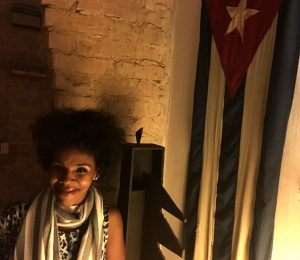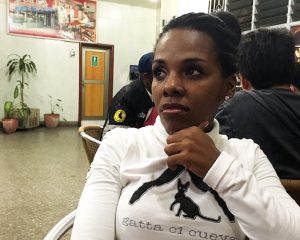Article, photos and video by Vanessa Santana
HAVANA — On a recent Monday night at Cafetería Sofía in the Vedado neighborhood , the chatter and cigarette smoke of locals and tourists alike filled the venue. With the band’s introduction, a 37-year-old Afro-Cuban singer gracefully approached the microphone on stage.

With her radiant smile and a pair of maracas in hand, she rhythmically swayed to the band’s beat. In seconds, her voice turned the casual café into a lively dancehall.
Loipa Pinós Villalón conveys her deep passion for music every time she performs. The resilient single mother of a young son has found a way to continue her career as a Cuban soloist despite limited resources, instances of racism and other challenges.
“This is a constant career where learning never ends, especially in my country – a place infinitely rich in musical history and culture,” said the artist, who was born in Guanabacoa, a neighborhood in eastern Havana.
Cuba prides itself on its music, a main component of the nation’s cultural identity, a place where artists are well respected, are supposed to have a high standard of living in the socialist system and can travel more freely than most Cubans.
But these benefits have yet to reach Pinós Villalón, she said.
“I have been rejected from singing at certain places because I am black,” she said. They have told me I’d have to straighten my hair, use wigs or even dye my hair in order perform – so I could look more white and less black,” she said . “I used to cry many nights. But then I realized I am who I am and I cannot continue to change my identity to please others.”
The issue of race is not a foreign concept in Cuba, where the population of 11 million is more than 60 percent black or mixed race, according to the Institute for Cuban and Cuban-American Studies at the University of Miami.
“It’s a very important observation to see the relationship between economic competition and racial discrimination,” said Robin J. Hayes, who is on the faculty of the New School in New York, after a recent New York screening of her award-winning documentary Black and Cuba. “When one feels like they’re in the Hunger Games, chasing after every dollar, and feeling economically insecure, the racial divides become exacerbated.”
Cuba’s socialist government, put in place in 1959 after the revolution led by Fidel Castro, somewhat evened the playing field among races with its jobs programs and free health services and education for all, Hayes said, adding that the slow introduction of economic reforms in recent years has brought more attention to imbalances in opportunities along race lines.
Pinós Villalón came late to her musical career. She said she first studied gastronomy, hoping to work in Cuba’s thriving tourism industry, although she always thought she would eventually follow her true passion. As soon as she learned fluent English at the Técnico Medio School, she stopped attending the school to pursue a singing career.
The daughter of a Russian translator and a mathematician, no one in her immediate family had a musical background, forcing her to learn alone through trial and error. She has also taken on other jobs to sustain a life for her and her 3-year-old son, David. She has worked as a hair stylist, makeup artist a seamstress and designer.
At 26, Pinós Villalón enrolled in the Gerardo Delgado Guanche Conservatory, where she studied classical guitar for four years. Since then, she has learned to play more instruments, such as minor percussion, including the güira, a cylindrical metal percussion instrument, and maracas, and the piano.
“The school certified me as a musician, not a singer, so I had to continue to find ways to prove that I could work as a singer,” she said.
Pinós Villalón is building her career at a time when tourism is growing in Cuba, a factor that one scholar said has created obstacles for Afro-Cubans in entertainment.
“There is a certain image Cuba wants to sell to tourists,” said Lourdes Gil, a Cuban-born poet, essayist and professor at Baruch College. “Unfortunately that image may favor the young, whiter-skinned performer, because it is what tourists would rather see and want to pay for. And that is a form of discrimination. Prejudice is still alive and well.”

Pinós Villalón said she continues to work on her music, studying her inspirations, including Ella Fitzgerald, Whitney Houston and the Beatles. Her curiosity resulted in her performing in different genres – from operas and ballads to jazz and salsa. Self-taught, she sings in English, French, Portuguese and Italian.
For seven years, she performed at the National Lyric Theatre of Cuba, and her drive has gained her performances all over Cuba.
“Cubans are emotional, we are passionate,” she said. “As a singer, this is the only way I know to resonate. Because a Cuban without passion is not Cuban,” Adding: “I want to know, see and learn other cultures. I know isn’t easy, but it’s my dream. And no matter what, I’d always come back to Cuba. My land, my people – nowhere else in the world compares.”
